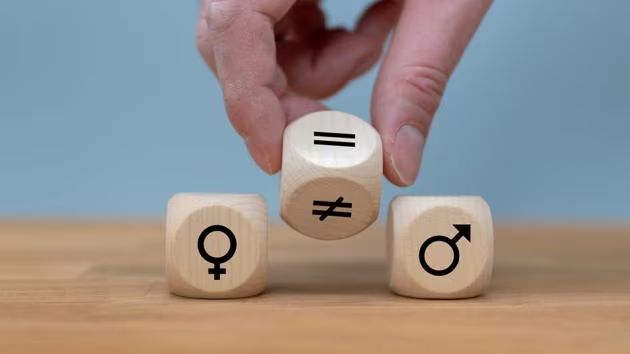If men and women are to work as equal partners, then we need new rules of engagement, ones that understand the centrality of mutual respect and consent

Symbol for gender equality. Hand turns a dice and changes a unequal sign to a equal sign between symbols of men and women.(Getty Images/iStockphoto)
Twenty years ago, Abhijit Das, the founder of Men Engage Alliance, attended a meeting on domestic violence. From the sidelines of the kitchen where he was working, Das noticed about 100 men had accompanied the 3,500-odd women and were listening keenly, but had no opportunity to participate. Apart from encouraging women, or accompanying them to meetings, what could these men do?
And so began a conversation with the men. They could help with the housework, take care of the children, fetch water. These were small but significant tasks that upended the idea of what is women’s work and what is her place in society.
That was the beginning of a campaign, Chuppi Todo, Hinsa Roko (break the silence, stop the violence) where men resolved to: One, not commit violence; two, speak up when they see violence, and three, support women who have faced violence.
People scoffed. Why on earth would men give up their privilege? What was in it for them?
Plenty, as it turns out. Das has spent the intervening years — he now heads the Centre for Health and Social Justice — expanding not only on how toxic ideas of masculinity demean men, but also how supportive relationships between husbands and wives, fathers and daughters, brothers and sisters, enrich their own lives.
“Gender equality cannot be seen as a continuing contest but as a collaboration that leads to relationships of mutual autonomy and interdependence,” says Das.
The struggle for gender equality has, understandably, focused on women — their health, their empowerment, their education. But, says Nishtha Satyam who heads United Nations Women in India, Bhutan, Maldives and Sri Lanka, “We missed the most critical pillar of change — men.”
You cannot expect sustainable change without involving men. “If the primary barrier for women is men, then one of the most important allies also has to be men. Who are we converting if we are talking only to ourselves?” Satyam asks.
Fortunately, India has male role models who are ready to support daughters in defiance of social norms; men like Mahavir Singh Phogat, the father of sisters Geeta and Babita, and men like Badrinath Singh, then an airport loader who sold his land so that he could finance the education of his daughter — the 23-year-old who was tragically gang-raped and killed in 2012.
We are not there yet. But women are slowly dismantling barriers to their progress. The Supreme Court ruling granting parity in the armed forces to assume permanent commissions is one such instance.
If men and women are to work as equal partners, then we need new rules of engagement, ones that understand the centrality of mutual respect and consent. We need male allies to acknowledge the potential of girls and women. And we need men who recognise that housework is equally a man’s job.
Perhaps this International Women’s Day, it would not be out of place to celebrate not just the women who break barriers but also the men who help them clear the hurdles.
Namita Bhandare writes on gender
The views expressed are personal